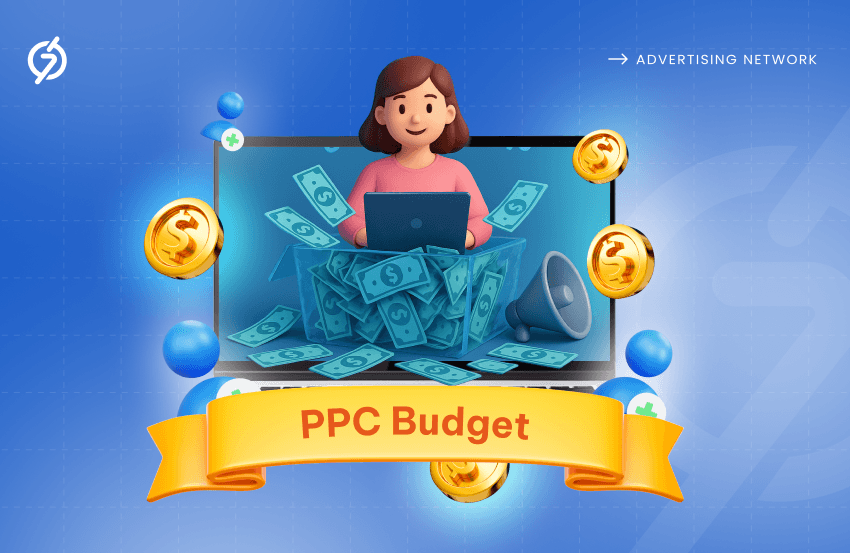Pay-per-click (PPC) advertising enables advertisers to pay only for measurable results, most commonly when users click on their ads. The primary objective is to invest in performance-driven marketing rather than spending money without guaranteed outcomes. However, when campaigns fail to deliver the desired results, costs can quickly escalate, leading to overspending and a poor return on investment (ROI). This is where understanding and implementing effective PPC budget allocation becomes essential.
PPC budget allocation helps you save money by identifying what is hurting your ad campaign. The more you understand, the better your chances of increasing profits without too much expenditure.
In this blog, we’ll guide you through everything you need to know about PPC budget allocation and management. You’ll learn about the key factors that may be causing overspending in your campaigns and discover smart strategies to optimize your PPC budget for better performance and results.
Why PPC Budget Allocation and Management is Important for Advertisers
Effective PPC budget management is absolutely critical for advertisers, as they serve as the financial backbone of digital marketing success, turning ad spend from a simple expense into a strategic investment that maximizes profit and growth.
Strategic allocation ensures that funds are dynamically directed toward the highest-performing advertising campaigns, keywords, and geographic regions that consistently deliver the best Return on Investment (ROI), shifting capital away from wasteful, low-converting PPC ad campaigns.
Know More About: PPC Advertising Checklist for New Advertisers
How to Plan and Allocate Your PPC Budget
When it comes to saving money on advertising, it’s important to carefully plan your PPC budget. Consider your goals, your niche, and how to choose the right PPC ad network. These factors are essential for managing your budget effectively.
Let’s take a closer look at these points and help you with the perfect PPC budget allocation.
Look for the Niche Where you are Suited Perfectly
Advertisers must recognize the importance of selecting the right niche for their PPC budget, as it results in less competition, reduced costs, higher conversion rates, and better ROI. Instead of broadly targeting a mass market and wasting money on uninterested audiences, a niche focus guarantees that every dollar reaches highly qualified prospects with specific needs.
When you are aware of your niche, it makes it easier to target people, as your targeting will be more effective and your ads will reach those already interested. This improves conversion rates, and you will see better ROAS by saving a lot of your PPC budget.
Set Your Goals Before it’s too Late
When allocating a PPC budget, the first step should always be to define your goal because, without knowing what to do next, you are like someone in a desert looking for water. Your goal can be brand awareness, lead generation, direct sales and revenue generation, or even customer retention.
When you know what your goal actually is, you can perform much better by allocating your budget accordingly, using pricing models like CPC, CPM, or CPA that best suit your needs. This will help you spend less and achieve the results you have been aiming for.
Know More About: How To Choose the Best Pricing Model For Online Advertising
Try out Ad Platforms, Stick to the one Where you get Results
Choosing the right PPC ad network is crucial when setting your PPC budget because it’s the first step where you need help and can save money. There are many PPC ad networks, but not all are the same: some offer fake traffic, resulting in wasted spend with no real benefit.
We suggest you make a minimum deposit and test it with many ad networks; the one that satisfies you the most is the best for you. Some of the best PPC ad networks we suggest are 7SearchPPC, Google Ads, and Propeller Ads. Selecting the right ad network will give you the results you have been looking for and save you a lot of money.
Know More About: Checklist for Choosing the Right Ad Network: Key Criteria and Tips
Choose Options Such as Search Ads or Display Ads
Options like search ads or display ads also play a major role in PPC budget allocation. Search ads target users actively seeking specific products or services, making them ideal for driving direct conversions. These ads usually have a higher cost-per-click (CPC) due to keyword competition, but often generate a better ROI since they capture high-intent traffic.
In contrast, display ads are more visually oriented and appear on websites or apps to build brand awareness among a broader audience. They tend to have lower CPCs but may deliver fewer direct conversions. Therefore, businesses must allocate their PPC budget strategically, depending on their marketing goals. If the aim is to increase sales quickly, more budget may go toward search ads; however, if the goal is to enhance visibility and awareness, display ads are best.
Moreover, optimizing your landing page is also crucial since it’s the user’s first impression. A well-designed, responsive, and mobile-friendly landing page with proper CTAs helps users understand the next steps and reduces bounce rates, ultimately saving you money.
Know More About: Display Ads vs Search Ads: What’s the Difference?
Allocate Budget Dynamically on a Daily Basis
Spending your entire ad campaign budget at once is never a smart strategy. As an advertiser, it’s crucial to ensure your funds last throughout the testing and optimization phases. You don’t want to run out of budget before you’ve had a chance to analyze what’s working.
A practical approach is to allocate your PPC budget daily. For example, if you deposit $100, you can set a daily spend limit of $20 for the next 5 days. This allows you to gather performance data, evaluate results, and make informed adjustments for better ROI.
Another effective tactic is dayparting, which involves scheduling your ads to run at specific times of day or on particular days of the week. This ensures your ads reach your audience when they are most active and likely to engage.
Know More About: Advertising Budget: Key Areas to Spend and Save
Spend on High-Performing Keywords and Targeting
When allocating your PPC budget, one of the most effective strategies is to focus your spending on high-performing keywords and precise targeting. After testing and analyzing your campaign results, identify which keywords, demographics, and audience segments deliver the best return on ad spend (ROAS). These are typically the keywords that attract quality leads, generate conversions, and align with your campaign goals.
By prioritizing these high-performing elements, you avoid wasting money on low-converting or irrelevant traffic. Go with the keywords that are already offering the best results and bid for them. This overall ensures that your ads reach the right people at the right time, boosting efficiency and reducing costs. Over time, continuously monitor and adjust bids to maintain performance.
Read More About: Power of Keywords: An In-Depth Analysis of PPC Keyword Research
The Significance of A/B Testing for PPC Campaign Budgeting
Knowing which of your ad campaigns is delivering results is important because it helps you evaluate your performance and allocate your PPC budget where it’s needed most. This is where A/B testing becomes valuable; it helps you understand which of your two ad copies is performing better.
A/B testing is a method of comparing two versions of an advertisement to determine which performs better. It helps marketers make data-driven decisions by analyzing user responses and optimizing ad campaigns for improved engagement and conversions. With A/B testing, you will know where to spend and where to stop.
Here are 5 short points on how A/B testing is useful in PPC budget allocation:
- Identifies High-Performing Ads – Reveals which ad variations deliver better CTR or conversions, helping allocate more budget.
- Optimizes Spend Efficiency – Ensures funds are directed to campaigns that deliver the best ROI.
- Reduces Wasted Budget – Prevents overspending on underperforming keywords, audiences, or ad creatives.
- Improves Targeting Accuracy – Tests different audience segments to find the most profitable ones for future investment.
- Supports Data-Driven Decisions – With A/B testing, you can easily allocate budgets based on performance data rather than assumptions.
Know More About: 7SearchPPC Postback URL: A Smarter Way to Track Conversions
How to Calculate PPC Budget
To calculate the PPC budget, consider factors such as conversion rates and revenue. Let’s take a look at how to calculate a PPC budget so you can easily optimize a PPC campaign.
When the Goal is Conversion
If your goal is to drive conversions, whether that means increasing sign-ups or boosting spending, this simple formula will help you determine the ideal budget. This formula considers your desired number of conversions, the average cost per click (CPC), and the expected conversion rate. Master these numbers, and you’ll have a clear roadmap to hit your growth goals with precision.
PPC Budget = Desired Conversions × Average CPC / Conversion Rate
The main goal for this PPC ad campaign budget is to spend only on conversions since they want leads, enabling the advertiser to allocate their budget more easily.
Example:
Imagine your campaign goal is to generate 1000 conversions, and your average cost-per-click (CPC) is $1.21. You expect a 7% conversion rate (0.07) for your ads. To determine the PPC budget required to achieve these 1000 conversions, you would use the following formula:
PPC Budget = 1000 x 1.21/0.07 = $17285
You have to spend $17285 to reach your goal.
Know More About: What is CPC (cost per click)? How PPC advertising works
When the Goal is Generating Revenue
To effectively generate revenue while maximizing profits, calculate your PPC budget based on your target revenue, the expected conversion rate, and the average order value.
PPC Budget = Target Revenue / Conversion Rate × Average Order Value
The primary goal of advertisers in this PPC ad campaign budgeting is to spend only when they generate revenue, which benefits them in many ways.
Example:
Imagine you have set your business revenue goal of $20,000 with a PPC ad campaign. You expect a 3% conversion rate (0.03) from your ads, and your average order value is $200. To determine the PPC budget needed to achieve this revenue goal, use the following formula:
PPC Budget = 20,000 / 0.03 × 200 = $13,3333
You have to spend $13,3333 to reach your goal.
How to Manage Your PPC Budget For Better Outcomes
To achieve effective results, it’s important to manage your PPC budget wisely. This can be done by adjusting low-performing ads, allocating more budget to areas that are yielding positive results, and investing in high-performing keywords. Additionally, consider how to distribute your spending on a daily or weekly basis.
Let’s understand these points better and know how you can easily manage your PPC budget for better outcomes.
- Review Your Ad Performance: One of the most important factors is reviewing your ad performance because knowing which ad performs the best allows you to allocate your budget accordingly and spend more on it for better results.
- Set Daily and Weekly Ad Spend Limit: Spending your entire ad budget on the first day is generally not advisable. Instead, manage your budget by setting daily or weekly limits. This approach helps prevent budget exhaustion and ensures consistent campaign performance over the month.
- Spend on High-Performing Keywords: Bidding on high-value keywords is worthwhile if they deliver results, as you should regularly track performance to manage your budget effectively. Keep investing in keywords that meet your goals, but pause or stop those that don’t.
- Budget Allocation for Ad Campaign: Shifting your budget to the ads you believe are delivering the best results is important. The key step is optimizing your ad campaign by identifying the top-performing ad and then allocating more budget to it.
- Reallocate Budget Based on Seasonal Trends: If your business experiences seasonal spikes in demand, adjust your budget accordingly. Manage your budget during peak times to maximize visibility and sales, and reduce spend during off-peak times to conserve resources. This requires careful analysis of past trends and forward planning.
Conclusion
Allocating a budget for a PPC ad campaign is essential to prevent overspending. It’s important to clearly understand your niche and the goals you want to achieve when setting your PPC budget. Selecting the right ad network and recognizing the significance of A/B testing are also crucial steps. Proper PPC budget pacing is vital, and a thorough understanding of these factors will help you manage your budget effectively.
Frequently Asked Questions (FAQs)
How is PPC budget allocation defined, and why does it matter?
Ans. PPC budget allocation is the strategic distribution of your advertising funds across campaigns, keywords, and various other factors. It is important because it ensures your budget is spent on high-performing ads, maximizes ROI, and prevents overspending.
What factors should I consider when setting a PPC budget?
Ans. When allocating PPC budget, consider your business goals, niche, target audience, the right PPC ad network, and ad formats (search vs. display). Understanding these ensures efficient and profitable budget allocation.
How can PPC budget allocation improve ROI?
Ans. It’s important for any advertiser to consider budget allocation when optimizing a PPC campaign, as it reduces wasted spend, increases conversions, and ultimately improves return on investment.
What strategies help optimize PPC campaigns for better performance?
Ans. To optimize PPC campaigns for better performance, use A/B testing, focus on high-performing keywords, target the right audience, select the best ad networks, and allocate your budget dynamically to maximize ROI.
How often should I review and adjust my PPC budget?
Ans. Review your PPC budget daily or weekly during the testing phase, and adjust monthly for long-term campaigns. Regular analysis ensures your budget stays aligned with campaign performance.
What is the best way to allocate budget across high-performing campaigns?
Ans. Analyze campaign performance regularly, increase budgets for high-CTR/high-conversion campaigns, and reduce or pause spending on underperforming campaigns. This ensures every dollar contributes to ROI.
















